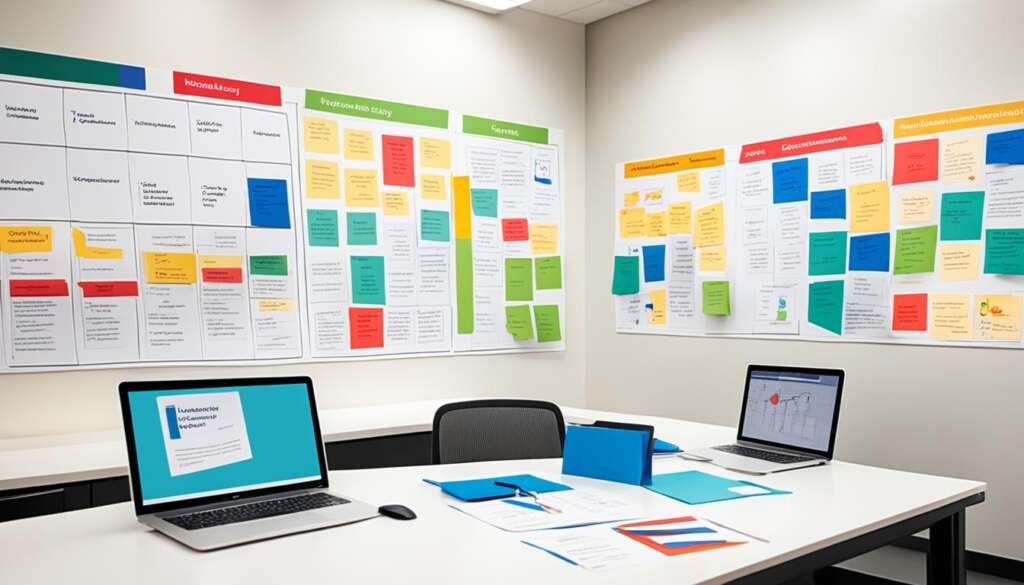Ever pondered why some careers excel while others plateau? The answer might be more straightforward than anticipated. As a professional committed to growth, I’ve learned that setting personal goals is crucial for career advancement. It transcends mere job progression; it’s about enhancing your professional growth and realizing your full potential.
Occassionally I might feature some affiliate links in my articles. If you make a purchase through these links, I may earn a small commission at no extra cost to you. Thanks for supporting me.
In today’s dynamic work landscape, staying relevant requires continuous evolution. That’s where personal development goals for work become pivotal. They act as our compass, steering us through professional challenges and opportunities. By prioritizing self-improvement, we’re not just fulfilling our job duties; we’re sculpting our careers with intention and foresight.
Let’s delve into how these goals can revolutionize your work life and drive you towards success. Whether you’re at the beginning of your career or seeking to revitalize it, grasping and applying personal goals is key to professional satisfaction and advancement. Are you prepared to steer your career development? Let’s begin!
Understanding Personal Goals for Work
Setting personal goals for work is a crucial step for professional growth. It helps me focus on what’s essential in my career. By defining clear performance objectives, I can drive my development and track my progress.
Defining Personal Development Goals
Personal development goals are key to improving my skills and enriching my work life. These goals might involve mastering new software, enhancing my public speaking, or obtaining a professional certification. By focusing on skill enhancement, I’m actively shaping my career path.
The Importance of Goal-Setting in Professional Life
Goal setting is vital in my professional life. It provides direction, boosts productivity, and defines success for me. With clear objectives, I’m more driven to overcome challenges and advance in my role.
How Personal Goals Contribute to Career Success
My personal goals significantly contribute to my career success. They help me:
- Expand my knowledge and skills
- Increase my employability
- Boost my self-confidence
- Find greater job satisfaction
By setting and achieving these goals, I’m constantly growing and preparing for future opportunities. This proactive approach has opened doors I never thought possible.
The SMART Approach to Setting Personal Goals for Work
Adopting the SMART approach has revolutionized how I set personal goals at work. It significantly enhances productivity and motivation. Let’s delve into this effective self-improvement strategy.
Specific: Clarifying Your Objectives
Setting specific goals involves clearly defining what I aim to achieve. Rather than “I want to improve my skills,” I specify “I want to learn Python programming.” This specificity ensures focused efforts and maintains direction.
Measurable: Quantifying Progress
Ensuring goals are measurable is crucial. For instance, aiming to boost sales, I set a quantifiable target like “Increase monthly sales by 15%.” This method allows for the tracking of progress and sustains motivation.
Achievable: Setting Realistic Targets
I set goals that challenge yet remain attainable. This balance fosters motivation without inducing overwhelm. It’s about stretching my abilities while acknowledging my limitations in terms of resources and time.
Relevant: Aligning Goals with Career Aspirations
It’s essential to align my goals with my career ambitions. This alignment ensures focus and boosts employee motivation. Each goal serves as a milestone towards my overarching career goals.
Time-bound: Establishing Deadlines
Imposing deadlines on my goals instills a sense of urgency. For instance, “Complete the Python course by the end of this quarter.” This approach prioritizes tasks and enhances accountability.
The SMART method has revolutionized my goal-setting process. It’s now a preferred productivity hack, propelling both my personal and professional growth.
Key Areas for Personal Goals in the Workplace
Setting personal goals at work is essential for professional growth and career success. I’ve discovered that focusing on specific areas can significantly enhance my performance and job satisfaction.

Work-life balance is a top priority for me. I set goals to manage my time effectively, reducing stress and enhancing overall well-being. This involves planning regular breaks and setting clear boundaries between work and personal life.
Skill enhancement is another crucial aspect of personal goal-setting. I actively seek opportunities to learn new technologies, improve my communication skills, and broaden my knowledge base. This approach not only makes me more valuable to my employer but also opens up new career avenues.
Professional growth extends beyond skill acquisition. I set goals to expand my professional network, take on leadership roles, and contribute to impactful projects. These objectives help me progress in my career and make a significant impact in my field.
| Goal Area | Example Goal | Benefits |
|---|---|---|
| Work-life Balance | Implement a daily schedule with defined work hours | Reduced stress, improved productivity |
| Skill Enhancement | Complete an online course in project management | Increased job competency, career advancement |
| Professional Growth | Attend two industry conferences this year | Expanded network, exposure to new ideas |
By concentrating on these key areas, I’ve witnessed significant improvements in my work performance and overall job satisfaction. Setting personal goals has become a fundamental part of my professional journey.
Strategies for Achieving Your Personal Goals for Work
Reaching your professional aspirations demands a strategic approach. I’ll share proven tactics to aid you in your career development journey and enhance employee motivation.
Creating an action plan
A well-structured action plan is essential for setting personal goals for work. Divide your objectives into smaller, manageable tasks. This method makes your goals less overwhelming and more attainable.
Seeking feedback and support
Don’t hesitate to seek input from colleagues and supervisors. Their insights can refine your performance objectives and offer valuable guidance for your career path.
Tracking progress and adjusting goals
Regularly monitor your advancement using goal-tracking tools or simple checklists. Be flexible and ready to adjust your targets based on real-world results and changing circumstances.
Celebrating milestones and achievements
Recognize your progress, no matter how small. Celebrating achievements boosts motivation and reinforces positive habits, keeping you focused on your career development goals.
| Strategy | Benefits | Implementation Tips |
|---|---|---|
| Create action plan | Clarity and focus | Use SMART criteria |
| Seek feedback | Improved performance | Schedule regular check-ins |
| Track progress | Accountability | Use goal-tracking apps |
| Celebrate milestones | Increased motivation | Set rewards for achievements |
By implementing these strategies, you’ll be well-equipped to achieve your personal goals and drive your career forward. Remember, consistent effort and adaptability are crucial for long-term success in your professional life.
Conclusion
Setting personal goals for work significantly enhances professional growth. I’ve witnessed how it elevates motivation and propels career success. Taking control of our development unlocks new opportunities and skills.
The SMART approach is pivotal in crafting goals that resonate. By ensuring our objectives are specific, measurable, achievable, relevant, and time-bound, we pave the way for tangible progress. It’s not merely about dreaming big; it’s about executing concrete steps towards our ambitions.
Personal goals for work transcend mere career advancement. They’re about achieving fulfillment and happiness in our daily tasks. As we progress and meet our goals, we enhance our contribution to our teams and organizations. This synergy benefits everyone on our professional path.
FAQ
What are personal development goals for work?
Personal development goals for work are benchmarks set to enhance abilities, skills, and overall quality of work life. They are essential for career advancement and pave the way for success and fulfillment.
Why are personal goals important in professional life?
Goal-setting in professional life is crucial as it provides direction, improves productivity, and helps define personal success. These goals contribute to career success by enhancing employability prospects, raising self-confidence, and finding satisfaction in one’s career.
What is the SMART framework for setting personal goals?
The SMART framework is an effective approach to setting personal development goals. It stands for Specific, Measurable, Achievable, Relevant, and Time-bound. This approach helps create a robust framework for personal development that aligns with current roles and positions individuals for future opportunities.
What are some key areas for personal goals in the workplace?
Key areas include enhancing professional knowledge, increasing productivity, prioritizing professional self-care, strengthening communication skills, expanding professional networks, organizing workspace, developing emotional intelligence, mastering new professional skills, conquering professional challenges, and practicing mindfulness and gratitude at work.
What strategies can help achieve personal goals for work?
Strategies include creating a detailed action plan, seeking feedback, tracking progress, celebrating milestones, improving time management, enhancing professional relationships, cultivating resilience, getting comfortable with leadership, and continuously learning new skills.
Why is pursuing personal development goals important for career success?
Setting and pursuing personal development goals for work is crucial for professional growth and career success. It leads to increased motivation, improved employee communication, and overall happiness in the workplace. Companies that support personal growth of their workforce see benefits in employee retention and innovation.

